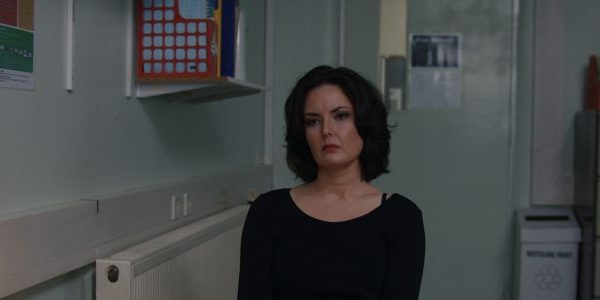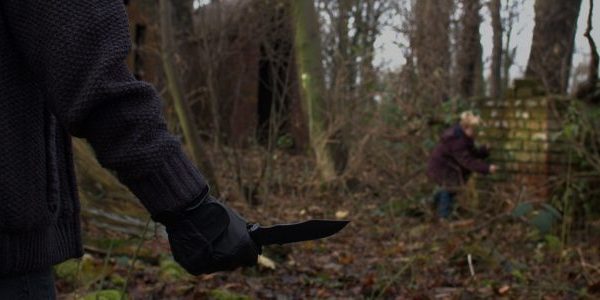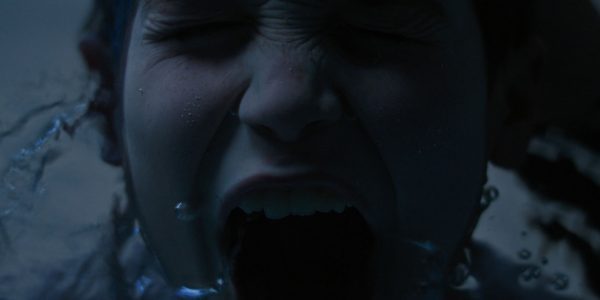What Makes The Perfect Horror? A Talk With GENE Director Nick Padley

What would you do if you discovered your child was a psychopath in the making?
Gene is a short horror film from director Nick Padley, starring Jack Maw and Emma Wise. The story centres around a recently widowed mother who is forced to take drastic action when her eleven year old’s teacher raises some serious concerns.
In just ten minutes Gene will suck you in and spit you right back out with an unexpected and shocking twist, which leaves you hungry for more. This excellent horror cleverly hands you the clues whilst manipulating you into missing them until the very last moment.
The short has screened at a number of film festivals and received Official Selection at Nightmare Film Festival, No Gloss Film Festival, Spooky Empire Festival and British Horror Film Festival, but what’s next? The film is a perfect example of why short film is so important in the industry. With many depths to the twisted plot and brilliant character development, it is clear to see why there has been speculation of development into a feature or series.
Holly Wyatt for Film Inquiry: Horror is a genre which has been reworked and explored by different writers for centuries. What was the process to writing an original yet effective horror narrative?
Nick Padley: I’m not sure that I really have the answer to that. I was lucky to be inspired by Emma Wise’s initial short story which buried itself deep in my mind. Emma, the lead actress and producer of the film initially crafted a story focused solely on Gene and his mother and it was extremely dark with a very bleak conclusion.
I found myself both fascinated and traumatised by the story, spending a lot of time filling in some of the gaps and trying to find a way to make the ending less disturbing! In the end finding that little bit more back story to the characters of Gene and his mother made the ending a little easier to swallow. I guess the desire to achieve that end result pushed me to write something that felt a little different than the norm.
It’s fair to say Gene leaves the audience on the edge of their seats and filled with intrigue. Are there future plans to develop the short film into something more?
Nick Padley: Something that became evident fairly early on in post-production was that there was more story to tell. I’m part-way through a script for part two and I have an outline for a third and final part. It’s exciting and perhaps a pretty unusual way to progress (by carrying on in successive short form pieces) but it’s fun being a little bit different.

A lot of people have asked if I’d like to remake or develop Gene as a feature and that could be an option further down the line, but right now it fits nicely into two further short parts. It should give a satisfying conclusion to everything and introduce a couple of interesting new characters.
I know some people felt a little frustrated that Gene ends in the way it does, as they want to know more. We can certainly give them that finality they’re craving but take them for a fun ride first!
The character development throughout Gene is extremely effective. As a writer, how crucial is developing your characters in order to bring a script to life?
Nick Padley: In terms of the narrative, a few viewers of the film commented on feeling a little hoodwinked in terms of where they thought the story was going, but a few have also admitted that they could see a lot of the clues had already been planted throughout the story.
I don’t think that was a technique that I consciously decided on… I’ve just always liked to really flesh out a character and give a reason for the way they behave… it was just very subtle with these particular characters. A good friend’s stepfather is a hypnotherapist and often when I’ve been over at their house we’ve chatted about what he does as it’s such a fascinating topic.
One thing he talked about was how some people use hypnotism to influence people in their everyday life. They know just how to act… every little nuance is part of a performance used to influence the way other people see them. I guess that was how I saw the character of Lauren.
Whether or not that character is aware of that technique, she certainly has a natural affinity for it and in some instances it’s worked on the audience as well as the other characters in the story.
Gene has a very striking style visually. Are there any particular filmmakers who have inspired you over the years?
Nick Padley: I’d love to take full credit for that, but it really is a shared vision as Gene’s DoP, Alex Veitch, also added some flavour through his own ideas and contributed to the overall aesthetic.
In terms of style a few people have mentioned a feel of Argento and Carpenter after having watched the film and I can see why those comparisons might be made. I’m cool with that, as long as those elements are seen as a nod to their work and don’t take people out of the story.
My visual approach has certainly been influenced by some of the filmmakers I admire but I didn’t go to film school, so watching movies has been a big chunk of my education! I am a bit of a horror nut, so I grew up loving the work of David Cronenberg, John Carpenter, Dario Argento, Sam Raimi and George A Romero in particular. However, I’d also absorb all sorts of ideas on lighting and blocking from a number of different genres. It’s an addiction and can be frustrating when I’m sat watching a movie and want to just enjoy it but I’ll find I’m an hour in and have been picking apart how it was all put together!

Learning in that way is perfectly acceptable but you also need bring your own ideas to the table and it’s about influence and inspiration as opposed to straight up re-creation. The use of POV to open Gene immediately brings to mind the stunning (and way more elaborate) opening of John Carpenter’s Halloween, but it’s done differently and more stripped back. That was partly due to our limited resources but also because it fitted our story better that way.
In terms of the Argento comparison, I think maybe the film feels influenced by the Giallo horror genre but that is not Argento-specific, and I’d say it’s more in terms of the psychological horror aspect of Gene.
Our use of hard light from reasonably large light sources through windows was reasonably motivated and realistic whereas if you look at a film such as Suspiria (one of my favourite movies) it’s absolutely stunning to look at but the lighting isn’t really even attempting to be semi-realistic! I’m very happy with the look of Gene, particularly knowing how limited the resources we had.
The number of platforms for short film is growing, such as film festivals as well as online. As a filmmaker, how important is it that this continues?
Nick Padley: I think it’s great how the market is developing and diversifying and it will be interesting to see what is the norm for film distribution and film festival attendance in a few years. Gene was a film I knew I wanted to push out to festivals prior to starting production but it was also important to me that it would be made available online for free once it had finished its festival run.
I think things have moved on quite a bit in the last few years in terms of distribution. I barely know anyone that doesn’t have a Netflix or Amazon Prime account and we have generally become totally at ease with consuming content on demand via a variety of outlets.
It’s certainly easier to push your film out to an audience but you still have to be savvy about finding that audience and pointing them in the direction of your film. We are yet to release Gene to the masses, so I’ll have my fingers crossed that we can generate some decent traffic towards the film!
The experience of making and marketing the film has been invaluable. I’ve learnt so much about the application process for festivals and that was mostly through making mistakes.

I initially pitched Gene as a horror film and although it contains elements of horror, it is more of a psychological piece and that label put off some festivals and for some of the more ‘hardcore’ genre festivals it wasn’t horror enough. I’m sure it could have worked in either niche, but I maybe spent too much time trying to re-define what it was and ultimately ended up going with a bit of a scattergun approach to festivals which wasn’t the best plan.
Another slightly bad move was applying to quite a few festivals just before final deadline. It’s more expensive, there are hardly any spaces left for festivals to fill and it’s a long shot to achieve success. Take your time and plan in advance!
What are your future hopes for Gene?
Nick Padley: I want us to have fun telling the rest of the story and then who knows. I’d be lying if I said I don’t harbour dreams of doors opening to make a feature, but I’ll be satisfied if we can find an audience who love the content and want to see where the story goes.
I’m not worried about more festivals with the successive films… I just want to make something that can get out to a large online audience and for horror fans to enjoy what we’ve made.
Head over to the website for more information, and if you want to follow Gene’s story as well as keep up to date with online release dates, make sure you check out its Twitter and Facebook page!
Does content like this matter to you?
Become a Member and support film journalism. Unlock access to all of Film Inquiry`s great articles. Join a community of like-minded readers who are passionate about cinema - get access to our private members Network, give back to independent filmmakers, and more.













